英国文学下册(诗歌)
英国著名诗歌
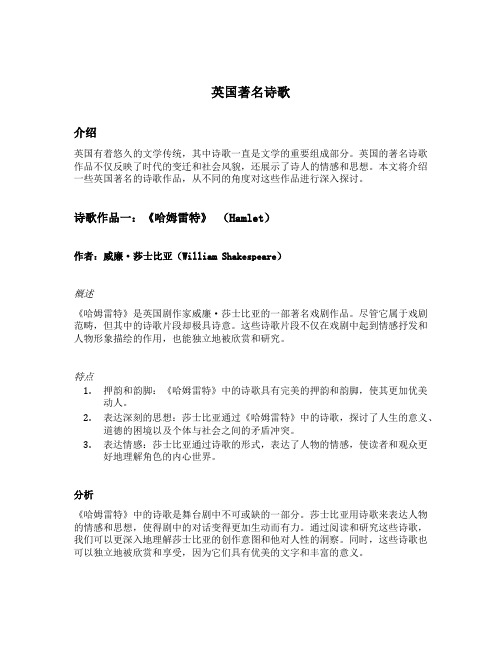
英国著名诗歌介绍英国有着悠久的文学传统,其中诗歌一直是文学的重要组成部分。
英国的著名诗歌作品不仅反映了时代的变迁和社会风貌,还展示了诗人的情感和思想。
本文将介绍一些英国著名的诗歌作品,从不同的角度对这些作品进行深入探讨。
诗歌作品一:《哈姆雷特》(Hamlet)作者:威廉·莎士比亚(William Shakespeare)概述《哈姆雷特》是英国剧作家威廉·莎士比亚的一部著名戏剧作品。
尽管它属于戏剧范畴,但其中的诗歌片段却极具诗意。
这些诗歌片段不仅在戏剧中起到情感抒发和人物形象描绘的作用,也能独立地被欣赏和研究。
特点1.押韵和韵脚:《哈姆雷特》中的诗歌具有完美的押韵和韵脚,使其更加优美动人。
2.表达深刻的思想:莎士比亚通过《哈姆雷特》中的诗歌,探讨了人生的意义、道德的困境以及个体与社会之间的矛盾冲突。
3.表达情感:莎士比亚通过诗歌的形式,表达了人物的情感,使读者和观众更好地理解角色的内心世界。
分析《哈姆雷特》中的诗歌是舞台剧中不可或缺的一部分。
莎士比亚用诗歌来表达人物的情感和思想,使得剧中的对话变得更加生动而有力。
通过阅读和研究这些诗歌,我们可以更深入地理解莎士比亚的创作意图和他对人性的洞察。
同时,这些诗歌也可以独立地被欣赏和享受,因为它们具有优美的文字和丰富的意义。
诗歌作品二:《抒情时期的诗歌》(Lyrical Ballads)作者:威廉·华兹华斯(William Wordsworth)、塞缪尔·泰勒·柯勒律治(Samuel Taylor Coleridge)概述《抒情时期的诗歌》是威廉·华兹华斯和塞缪尔·泰勒·柯勒律治共同创作的一部重要诗集。
这个诗集标志着抒情诗歌运动(Romantic Movement)在英国文学史上的重要转折点,也被认为是现代英国诗歌的起源。
特点1.自然主题:《抒情时期的诗歌》展现了诗人们对自然景观和人与自然的关系的独特感悟。
英国诗人经典诗歌鉴赏
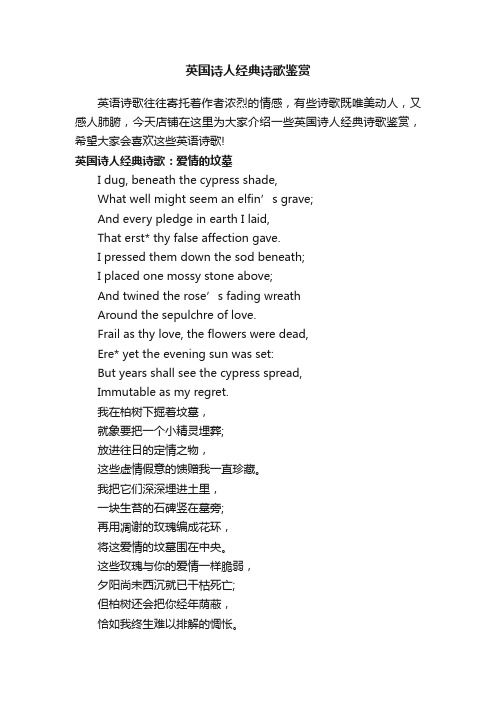
英国诗人经典诗歌鉴赏英语诗歌往往寄托着作者浓烈的情感,有些诗歌既唯美动人,又感人肺腑,今天店铺在这里为大家介绍一些英国诗人经典诗歌鉴赏,希望大家会喜欢这些英语诗歌!英国诗人经典诗歌:爱情的坟墓I dug, beneath the cypress shade,What well might seem an elfin’s grave;And every pledge in earth I laid,That erst* thy false affection gave.I pressed them down the sod beneath;I placed one mossy stone above;And twined the rose’s fading wreathAround the sepulchre of love.Frail as thy love, the flowers were dead,Ere* yet the evening sun was set:But years shall see the cypress spread,Immutable as my regret.我在柏树下掘着坟墓,就象要把一个小精灵埋葬;放进往日的定情之物,这些虚情假意的馈赠我一直珍藏。
我把它们深深埋进土里,一块生苔的石碑竖在墓旁;再用凋谢的玫瑰编成花环,将这爱情的坟墓围在中央。
这些玫瑰与你的爱情一样脆弱,夕阳尚未西沉就已干枯死亡;但柏树还会把你经年荫蔽,恰如我终生难以排解的惆怅。
英国诗人经典诗歌:美好愉快的夏天Simmer’s a pleasant time,Flow’rs of ev’ry colour;The water rins* o’er the heugh*,And I long for my true lover.Ay waukin O,Waukin still and wearie:Sleep I can get naneFor thinking on my dearie.When I sleep I dream,When I wauk I’m eerie;Sleep I can get nane,For thinking on my dearie.Lanely night comes on,A’ the lave are sleepin’;I think on my bonnie lad,And I bleer my een* with greetin’.Ay waukin O,Waukin still and wearie;Sleep I can get naneFor thinking on my dearie.美好愉快的夏天美好愉快的夏天,百花盛开争奇斗艳;溪水流过峡谷,我把至爱思念。
英国经典诗歌附翻译
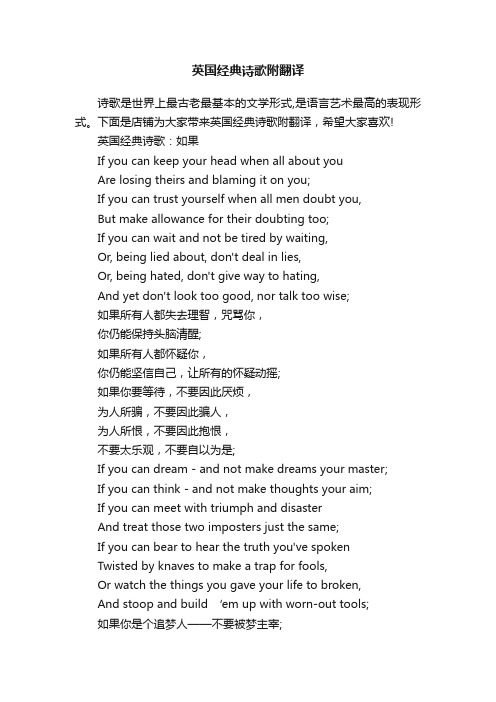
英国经典诗歌附翻译诗歌是世界上最古老最基本的文学形式,是语言艺术最高的表现形式。
下面是店铺为大家带来英国经典诗歌附翻译,希望大家喜欢!英国经典诗歌:如果If you can keep your head when all about youAre losing theirs and blaming it on you;If you can trust yourself when all men doubt you,But make allowance for their doubting too;If you can wait and not be tired by waiting,Or, being lied about, don't deal in lies,Or, being hated, don't give way to hating,And yet don't look too good, nor talk too wise;如果所有人都失去理智,咒骂你,你仍能保持头脑清醒;如果所有人都怀疑你,你仍能坚信自己,让所有的怀疑动摇;如果你要等待,不要因此厌烦,为人所骗,不要因此骗人,为人所恨,不要因此抱恨,不要太乐观,不要自以为是;If you can dream - and not make dreams your master;If you can think - and not make thoughts your aim;If you can meet with triumph and disasterAnd treat those two imposters just the same;If you can bear to hear the truth you've spokenTwisted by knaves to make a trap for fools,Or watch the things you gave your life to broken,And stoop and build ‘em up with worn-out tools;如果你是个追梦人——不要被梦主宰;如果你是个爱思考的人——不要以思想者自居;如果你遇到骄傲和挫折把两者当骗子看待;如果你能忍受,你曾讲过的事实被恶棍扭曲,用于蒙骗傻子;或者,看着你用毕生去看护的东西被破坏,俯下身去,用破旧的工具把它修补;If you can make one heap of all your winnings And risk it on one turn of pitch-and-toss,And lose, and start again at your beginnings And never breath a word about your loss;If you can force your heart and nerve and sinew To serve your turn long after they are gone, And so hold on when there is nothing in you Except the Will which says to them: "Hold on"; 如果在你赢得无数桂冠之后,然后孤注一掷再搏一次,失败过后,东山再起,不要抱怨你的失败;如果你能迫使自己,在别人走后,长久坚守阵地,在你心中已空荡荡无一物,只有意志告诉你“坚持!”;If you can talk with crowds and keep your virtue, Or walk with kings - nor lose the common touch; If neither foes nor loving friends can hurt you;If all men count with you, but none too much;If you can fill the unforgiving minuteWith sixty seconds' worth of distance run - Yours is the Earth and everything that's in it,如果你与人交谈,能保持风度,伴王同行,能保持距离;如果仇敌和好友都不害你;如果所有人都指望你,却无人全心全意;如果你花六十秒进行短程跑,填满那不可饶恕的一分钟——你就可以拥有一个世界,这个世界的一切都是你的,更重要的是,孩子,你是个顶天立地的人。
英国文学Iwonderedlonelyasacloud的赏析整
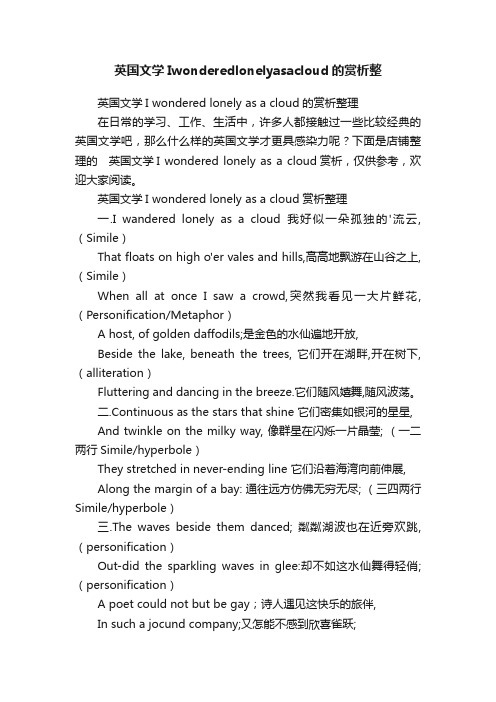
英国文学Iwonderedlonelyasacloud的赏析整英国文学I wondered lonely as a cloud的赏析整理在日常的学习、工作、生活中,许多人都接触过一些比较经典的英国文学吧,那么什么样的英国文学才更具感染力呢?下面是店铺整理的英国文学I wondered lonely as a cloud赏析,仅供参考,欢迎大家阅读。
英国文学I wondered lonely as a cloud赏析整理一.I wandered lonely as a cloud我好似一朵孤独的'流云,(Simile)That floats on high o'er vales and hills,高高地飘游在山谷之上, (Simile)When all at once I saw a crowd,突然我看见一大片鲜花, (Personification/Metaphor)A host, of golden daffodils;是金色的水仙遍地开放,Beside the lake, beneath the trees, 它们开在湖畔,开在树下,(alliteration)Fluttering and dancing in the breeze.它们随风嬉舞,随风波荡。
二.Continuous as the stars that shine 它们密集如银河的星星,And twinkle on the milky way, 像群星在闪烁一片晶莹; (一二两行Simile/hyperbole)They stretched in never-ending line 它们沿着海湾向前伸展,Along the margin of a bay: 通往远方仿佛无穷无尽; (三四两行Simile/hyperbole)三.The waves beside them danced; 粼粼湖波也在近旁欢跳, (personification)Out-did the sparkling waves in glee:却不如这水仙舞得轻俏; (personification)A poet could not but be gay;诗人遇见这快乐的旅伴,In such a jocund company;又怎能不感到欣喜雀跃;I gazed—and gazed—but little thought.我久久凝视——却未领悟What wealth the show to me had brought:...这景象所给我的精神之宝。
英国文学期末考试-诗歌鉴赏分析部分
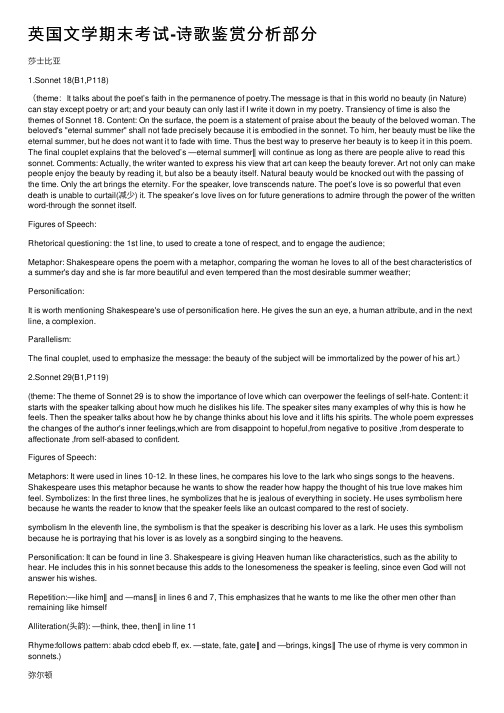
英国⽂学期末考试-诗歌鉴赏分析部分莎⼠⽐亚1.Sonnet 18(B1,P118)(theme:It talks about the poet’s faith in the permanence of poetry.The message is that in this world no beauty (in Nature) can stay except poetry or art; and your beauty can only last if I write it down in my poetry. Transiency of time is also the themes of Sonnet 18. Content: On the surface, the poem is a statement of praise about the beauty of the beloved woman. The beloved's "eternal summer" shall not fade precisely because it is embodied in the sonnet. To him, her beauty must be like the eternal summer, but he does not want it to fade with time. Thus the best way to preserve her beauty is to keep it in this poem. The final couplet explains that the beloved’s ―eternal summer‖ will continue as long as there are people alive to read this sonnet. Comments: Actually, the writer wanted to express his view that art can keep the beauty forever. Art not only can make people enjoy the beauty by reading it, but also be a beauty itself. Natural beauty would be knocked out with the passing of the time. Only the art brings the eternity. For the speaker, love transcends nature. The poet’s love is so powerful that even death is unable to curtail(减少) it. The speaker’s love lives on for future generations to admire through the power of the written word-through the sonnet itself.Figures of Speech:Rhetorical questioning: the 1st line, to used to create a tone of respect, and to engage the audience;Metaphor: Shakespeare opens the poem with a metaphor, comparing the woman he loves to all of the best characteristics of a summer's day and she is far more beautiful and even tempered than the most desirable summer weather; Personification:It is worth mentioning Shakespeare's use of personification here. He gives the sun an eye, a human attribute, and in the next line, a complexion.Parallelism:The final couplet, used to emphasize the message: the beauty of the subject will be immortalized by the power of his art.)2.Sonnet 29(B1,P119)(theme: The theme of Sonnet 29 is to show the importance of love which can overpower the feelings of self-hate. Content: it starts with the speaker talking about how much he dislikes his life. The speaker sites many examples of why this is how he feels. Then the speaker talks about how he by change thinks about his love and it lifts his spirits. The whole poem expresses the changes of the author's inner feelings,which are from disappoint to hopeful,from negative to positive ,from desperate to affectionate ,from self-abased to confident.Figures of Speech:Metaphors: It were used in lines 10-12. In these lines, he compares his love to the lark who sings songs to the heavens. Shakespeare uses this metaphor because he wants to show the reader how happy the thought of his true love makes him feel. Symbolizes: In the first three lines, he symbolizes that he is jealous of everything in society. He uses symbolism here because he wants the reader to know that the speaker feels like an outcast compared to the rest of society.symbolism In the eleventh line, the symbolism is that the speaker is describing his lover as a lark. He uses this symbolism because he is portraying that his lover is as lovely as a songbird singing to the heavens.Personification: It can be found in line 3. Shakespeare is giving Heaven human like characteristics, such as the ability to hear. He includes this in his sonnet because this adds to the lonesomeness the speaker is feeling, since even God will not answer his wishes.Repetition:―like him‖ and ―mans‖ in lines 6 and 7, This emphasizes that he wants to me like the other men other than remaining like himselfAlliteration(头韵): ―think, thee, then‖ in line 11Rhyme:follows pattern: abab cdcd ebeb ff, ex. ―state, fate, gate‖ and ―brings, kings‖ The use of rhyme is very common in sonnets.)弥尔顿3.On His Blindness(B1,P148)(Theme: Its theme is that people use their talent for God, and they serve him best so can endure the suffering best. This sonnet is written as a result of Milton’s grief, as he lost his eye sight at his middle age.Content:Lines 1-8: Milton gets rather impatient at the thought of his blindness in the middle age. Blindness prevents him from using his poetic talent by writing something great to glorify God. In an impatient mood Milton doubts if God would be just in demanding work from a blind man like him.Lines 8-14: Milton’s attitude of doubt passes off in a moment. His inner conscience rises up with its faith in God’s justice. He realizes that God does not need man’s work by way of service to him; nor does he care whether man uses His gifts. He has a lot of angels working for him. So, patient submission to His will is the best service to Him.Figures of Speech:Alliteration: my days in this dark world and wide (line 2)Metaphor: though my soul more bent / To serve therewith my Maker (lines 3-4). The author compares his soul to his mind. Personification/Metaphor: But Patience, to prevent / That murmur, soon replies . . . (lines 8-9).Paradox: They also serve who only stand and wait.Rhyme: This sonnet is written in iambic pentameter rhymed in abba abba cde cde, typical of Italian sonnet. )多恩4.Song(B1, P134)(Theme:Negative view about love. Content: The whole poem focus on the argument of whether beautiful women will be loyalty to love. In the first stanza, he use 6 impossible things to clarify his view that such women who both beautiful and loyalty do not exist in the world. In the second stanza, he describes the journey of a man who was born to strange sights and sware that there were no women true, and fair. In the last stanza, he agreed that it would be sweet if there were women true, and fair, but he won’t change his belief that there exist no women who are both true and fair. Figures of Speech: 第⼀节中⽤了imperative sentence祈使句,像在对话;metaphor将找到美丽⽽忠贞的⼥⼦⽐作第⼀节中的做那些离奇怪诞的事)5.Valediction: Forbidding Mourning: (B1,P135)(Theme:farewell and love. Content:In the first two stanzas the departure of the lovers is compared with the death of virtuous men. Then, he clarify that their love is high to the soul and the body departure cannot influence them any more. Their two souls are united into one like the gold that has excellent ductility. If souls are still two, then they will just like the compasses, separated but never really divided. At last, he asked his wife to take care of the family so that he can complete his missions without worries, just like the moving compass complete a full circle with the help of the fixed point.Figures of Speech:comparison⾼尚男⼈的死和他们的分离;Metaphor(Conceit):The two lovers are likened to the two points of a compass. The idea of the wife staying and minding the house while the husband goes away is old-fashioned now, but we can still comprehend it.Pun: Take the lines Thy firmness makes my circle just,/ And makes me end, where I begun.. Here the compass is doing two different things, and both have significance. "End where I begun" implies the finish of a circle as drawn by a compass; only through his wife's stability in the centre, Donne argues, can his circle be drawn correctly. However it also implies the closing of the compass - and Donne coming home to be with his wife.Symbolism: symbolism of gold is very important, as it is also the most precious and noble of all the metals. It is also the least reactive of all metals, which ties in with Donne's placing of the lovers above the emotional layer and makes their love difficult to destroy.Comments:Donne's basic argument was that most people's relationships are built on purely sensual things - if they are not together at all times, the relationship breaks down. I agree with him, because a real love should have no restrictions of distance or time, so long as lovers’ hearts and souls are bound to each other, there will be no reason for them to worry abouta temporary separation.)布莱德6.Songs of Innocence-The Chimney Sweeper(Theme: This poem protest the living working and conditions, and the overall treatment of youngchimney sweepers in the cities of England; also it expresses sympathy for these young chimney sweepers. Content:The first stanza tells the narrator's life story: abandoned by parents, working in thedark chimney and sleeping in dark, dirty soot. Probably it's the reflection of all the little chimney sweepers' life story. In the thir d line, the cry "'weep! 'weep! 'weep! 'weep!" is actually the child's attempt at saying "Sweep! Sweep! Sweep!", which was the c himney sweeper's street cry.The poem goes on to talk about Tom Dacre, one of the narrator's fellows in the second and third stanzas. The second stanza intr oduces Tom Dacre, who acts as a foil to the speaker. Tom is upset about his lot in life, then the narrator comforts little Tom, sha ving his curl white hair and getting bare, so that he needn't worry that his hair would get spoiled until Tom falls asleep. Here To m's family name "Dacre" is a homophone for the word "dark". In next three stanzas, the poem describes Tom's dream. He drea ms of an angel opening the coffins and freeing the sweepers. It shows the freeing of Tom and other sweeps from the oppressive lifestyle.When the angel tells Tom that ―if he’d be a good boy, He’d have God for his father and never want joy‖, he gives Tom hope that if he is good and does his job, God will be his father and bless him in the next life. Figures of Speech:symbolism,irony)7.Songs of Experience-The Chimney Sweeper(B1,P289)(Theme: This poem protest the living working and conditions, and the overall treatment of youngchimney sweepers in the cities of England; also it expresses sympathy for these young chimney sweepers.Content: In the first two lines, Blake gives us an image of an anguished child in a state of agony. In the second stanza, the child is pictured in a very more happier and playful mood. This soon changes when he decides to tell the stranger more about his parents. They are showed to be punishing their child for being so happy by "clothing in clothes of death and teaching him to sing notes of woe." It is very obvious the sweeper’s feels hate towards his parents for putting him in such sadness, but inst ead he chooses to hide it by making himself look happy and satisfied.It is clear in the last Stanza that Blake’s criticizing the Church, especially, and the state for letting a lot of these things happen. During this time many children were dying from being, either, worked to death or from malnutrition. Neither the state or the church did any thing to stop this and is obviously why Blake feels so much anger towards them. The sweeper’s parents are really no help towards their own child. This makes the reader wonder, if they are worshiping god, the source of good doings, why do they chose to ignore their own child. They would rather turn their heads the other way and instead find love at church. Figures of speech:partial tone:T he cry "'weep! 'weep! " is actually the child's attempt at saying "Sweep! Sweep! ‖,whichwas the chimney sweeper's direct cry. The use of the partial tone creates an ironic effect. It makes readers feel that the chimney children are weeping for their living and working conditions.symbolism,Contrast:In the first two lines, t he color black seems to be very important because it is used to represent sin against innocence, the color of the white snow.)8.Holy Thursday --From Songs of Innocence'(Theme: portrays unfortunate children as blessings to society and shows their gratitude towards God for all that he has done. Figures of speech: simile, metaphor, symbolismBlake tries to express an optimistic and hopeful image of innocent children singing to Christ onthe day of ascension. The poem’s rhythm is playful and childish and effectively carries out Blake’s image.In the first four lines, colorful children are marching into St Paul’s cathedral for the celebration of the ascension of Christ. From the footnote, one learns that these children are from the charity s chools in London, meaning that they are very poor and probably don’t have a family. Despite their hardships, the children are still described in a joyful, harmonic wayWith an ABAB rhyming pattern, the poem starts with a bouncing, nursery rhyme quality. The children’s problems are not an iss ue; they are still cute, innocent, and alive, like a river. The beadles that must keep the kids in order are portrayed as old and lifel ess men who have lost their childhood innocence. Even though these children are poor and homeless, they are showing hopeful ness and optimism when they go to sing the Lord’s praisesIn the next stanza, the children are again portrayed as sweet and innocent, and there is no mention of the hardships they must fa ce every other day in their life. There are a few different images that Blake gives the reader to express his idea that children are pure and free–flowing characters:Here, the children are a beautiful and vital part of the London society. They are ―flowers‖ that give pleasure to all men and wom en. Blake fails to mention that these children are a blight and burden to mankind. They are victims of a cruel and harsh world, a nd as a result, they reflect images of misery and poverty. However, in this stanza, the children are innocent lambs who have a ―r adiance all their own.‖ They are beautiful flowers and are pleasing to the entire world.In the final stanza, the children are singing to the heavens with songs of joy. They are singing the praises of the Lord to heaven on this glorious day.Here, the children are powerful and mighty and are capable of communicating with the heavens above. They believe that God tr uly loves them in spite of the fact that they are really the wretched of the earth. Even though they are penniless and homeless, the children raise their hands and sing their praise and thanks to Jesus.)9.Holy Thursday---From Songs of Experience(Theme: the condemn for the church or the god; sympathy for the poor childrenFigures of speech: contrast, irony, metaphorThis poem is negative and pessimistic and it questions the nature or existence of a God. The children are rejected and abused by society and they are exactly the opposite of the children in the first poem.This procession into the cathedral has religious intentions, but the speaker wonders how holy it is to have so many pitiful and m iserable children in a world that is so rich and prosperous. It doesn’t seem possible to him that these children are singing to the Lord out of pure happiness and thanksgivingThe speaker finds it hard to believe that these children are actually singing out praises of the Lord. He sees them so unhappy an d so poor, and yet they are thanking Jesus for all that he has done for them. The series of questions by the speaker in this stanza implies a tone of disbelief and amazement that heightens throughout the poem.In the last two stanzas, the speaker offers an explanation as to why these children are so poor and pitiful.The speaker believes that the life of the children is always dark, bleak, and bare. It will always be difficult, cold, and barren. He believes that the children are poor because they never have any sunshine or any rain. In other words, these kids don’t have the wonderful and plentiful eye of the Lord upon them. Blake believes that man could not decline into such a pitiful state if God is constantly watching over him. Throughout the ceremony, the children are praising God and all of His works. This prai se now seems very ironic since these children are not under the watchful eye of the Lord)10.The Lamb" --From Songs of Innocence(Theme: the origin of human, blessing for the human and GodContent: The poem begins with the question, ―Little Lamb, who made thee?‖ The speaker, a child, asks the lamb about its origins: how it came into being, how it acquired its particular manner of feeding, its ―clothing‖ of wool, its ―tender voice.‖ In the next stanza, the speaker attempts a riddling answer to his own question: the lamb was made by one who ―calls himself a Lamb,‖ one who resembles in his gentleness both the child and the lamb. The poem ends with the child be stowing a blessing on the lamb.Figures of speech:repetition:Repetition in the first and last couplet of each stanza makes these lines into a refrain, and helps to give the poem its song-like quality.rhetoric questionsSymbolism:The lamb symbolizes Jesus and the image of the child is also associated with Jesus.Comment:The poem is a child’s song, in the form of a question and answer. The first stanza is rural and descriptive, while the second focuses on abstract spiritual matters and contains explanatio n and analogy. The child’s question is both naive and profound. The question (―who made thee?‖) is a simple one, and yet the child is also tapping into the deep and timeless questions that all human beings have, about their own origins and the nature of cr eation. The poem’s apostrophic form contributes to the effect of naivety, since the situation of a child talking to an animal is a believable one, and not simply a literary contrivance. Yet by answering his own question, the child converts it into a rhetorical one, thus counteracting the initial spontaneous sense of the poem. The answer is presented as a puzzle or riddle, and even though it is an easy one—child’s play—this also contributes to an underlying sense of ironic knowingness or artifice in the poem. The child’s answer, however, reveals his confidence in his simple Christian faith and his innocent acceptance of its teachings.)11.The Tiger(B1,P288)(Theme:humans are incapable of fully understanding the mind of God and the mystery of his handiwork.But considering the social background of this poem, It could destroy the old system and establish a new one.Content:This poem begins with the author presents a series of questions that embodies the central problem: Who created the tiger? Or w as it Satan? Blake presents his question in Lines 3 and 4: What immortal hand or eye/ Could frame thy fearful symmetry? However, to express his bewilderment that the God who created the gentle lamb also created the terrifying tiger, he includes Satan as a possible creator while raising his rhetorical questions, the one he asks in Lines 5 and 6: In what distant deeps orskies/Burnt th e fire of thy eyes?Figures of speech:Symbolism:The tiger is symbolic of the revolutionary forces:the French people in the French Revolution to which Blake was a s upporter and it can also symbolizes evil, or the incarnation of evil.And that the lamb represents goodness, or Christ. Metaphor&alliteration:In Lines 3 and 4the author uses alliteration and metaphor to make comparison the tiger and his eyes to fi re.Symbol&Allusion:In Lines 5 and 6: In what distant deeps or skies/Burnt the fire of thy eyes? In these sentences, “Deeps” ap pears to refer to hell and “skies” refer to heaven which is the expression of symbol and Allusion.Comments:It is said that human souls have two sides: a good side, and an evil side."The Lamb" and "The Tyger," by William B lake, are both poems of deep meaning. They seem to explain both sides of human nature: the light and the dark, the yin and the yang, the good and the evil. They can also represent the transition from a child to an adult or even Heaven and Hell. "The Lamb " is a poem that is referring to the good side of the human soul, while "The Tyger" is referring to the dark side. The lamb brings to mind innocence,purity,children,or Jesus; the tiger brings to mind viciousness, cunning, danger, or death. )彭斯12.John Anderson my jo, John(B1, P294)(theme: love. Content:It’s a simple but warm poem about the commonplace feeling of a ordinary couple. The old wife recalls their encounter at their young ages and compare her husband’s young appearance with that of now. They has gone through so many years, and she blesses her husband and wishes joint happiness until their death.Figures of Speech:Metaphor/contrast: In line3 and line6, John’s locks are said to be as black as the raven when young but as white as snow now. The metaphor is so properly used, while the contrast between John’s young and aged years is also very vivid in delivering the massage of their peaceful and lasting marriage.Rhyme:Comments: This poem is very simple, but it remind me of a Chinese saying, ― I’ll take your hand and grow old with you.‖The love I dreamed of is just like this, more stability and less impulsion.)华兹华斯13.The Solitary Reaper(B2,P22)(theme:T he poet is fascinated with a Scottish peasant girl’s beautiful song.Content: Stanza 1: The poet heard a Scottish girl singing while reaping in the wheat field.Stanza 2: The poet is surprised to hear such a beautiful song in so remote aplace.Stanza 3: The poet doesn’t understand her song but knows it is about something sad. Stanza 4: The poet was so moved by her song that he could never forget it.Figures of Speech:Contrast:反衬⽤夜莺和杜鹃反衬少⼥歌声的优美Metaphor/synaesthesia:暗喻、通感声⾳在作者眼中变为有形的事物Vocative:呼语BEHOLD HER /O LISTEN,像在与⼈对话,拉近读者和说话者的距离Repetition:反复同源词反复Analogy:少⼥的歌声与夜莺和杜鹃的歌唱诗⼈与旅⼈及赫布⾥群岛Symbolism: 象征MOUNT UP THE HILL象征着⼈⽣的旅途Rhyme:iniambic tetrameter with the rhyme of ababccdd (except lines 1 & 3 In stanzas 1 and 4)Comments:⽣活中有时停下匆匆的脚步可能会有惊喜。
英国文学翻译诗歌
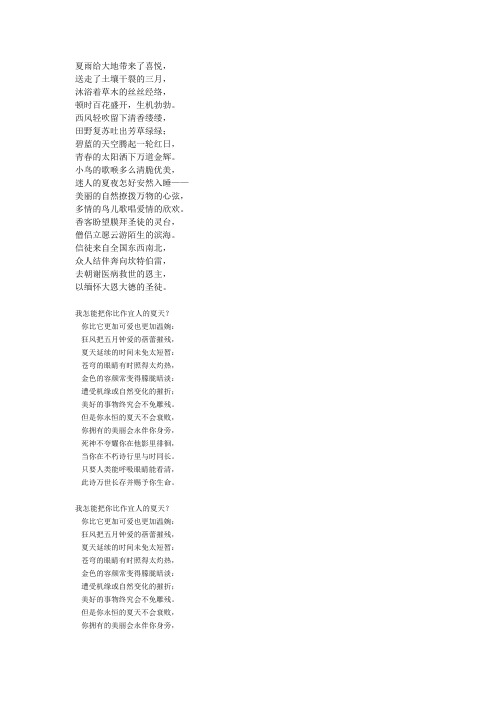
夏雨给大地带来了喜悦,送走了土壤干裂的三月,沐浴着草木的丝丝经络,顿时百花盛开,生机勃勃。
西风轻吹留下清香缕缕,田野复苏吐出芳草绿绿;碧蓝的天空腾起一轮红日,青春的太阳洒下万道金辉。
小鸟的歌喉多么清脆优美,迷人的夏夜怎好安然入睡——美丽的自然撩拨万物的心弦,多情的鸟儿歌唱爱情的欣欢。
香客盼望膜拜圣徒的灵台,僧侣立愿云游陌生的滨海。
信徒来自全国东西南北,众人结伴奔向坎特伯雷,去朝谢医病救世的恩主,以缅怀大恩大德的圣徒。
我怎能把你比作宜人的夏天?你比它更加可爱也更加温婉:狂风把五月钟爱的蓓蕾摧残,夏天延续的时间未免太短暂:苍穹的眼睛有时照得太灼热,金色的容颜常变得朦胧暗淡:遭受机缘或自然变化的摧折;美好的事物终究会不免雕残。
但是你永恒的夏天不会衰败,你拥有的美丽会永伴你身旁,死神不夸耀你在他影里徘徊,当你在不朽诗行里与时同长。
只要人类能呼吸眼睛能看清,此诗万世长存并赐予你生命。
我怎能把你比作宜人的夏天?你比它更加可爱也更加温婉:狂风把五月钟爱的蓓蕾摧残,夏天延续的时间未免太短暂:苍穹的眼睛有时照得太灼热,金色的容颜常变得朦胧暗淡:遭受机缘或自然变化的摧折;美好的事物终究会不免雕残。
但是你永恒的夏天不会衰败,你拥有的美丽会永伴你身旁,死神不夸耀你在他影里徘徊,当你在不朽诗行里与时同长。
只要人类能呼吸眼睛能看清,此诗万世长存并赐予你生命。
What though the field be lost? “失却了阵地算得什么?并非罄尽无望,All is not lost; the unconquerable will, 遗存有:不可征压之意志,And study of revenge, the immortal hate, 永不服屈之勇气,无休止之仇恨,And courage never to submit or yield. 百变难惩之报复决计—And what is else never to be overcome? 不可摧折,不可胜计。
英国文学诗歌赏析

Ode to the west 雪莱西风颂查良铮译1哦,狂暴的西风,秋之生命的呼吸!你无形,但枯死的落叶被你横扫,有如鬼魅碰到了巫师,纷纷逃避:黄的,黑的,灰的,红得像患肺痨,呵,重染疫疠的一群:西风呵,是你以车驾把有翼的种子催送到黑暗的冬床上,它们就躺在那里,像是墓中的死穴,冰冷,深藏,低贱,直等到春天,你碧空的姊妹吹起她的喇叭,在沉睡的大地上响遍,(唤出嫩芽,像羊群一样,觅食空中)将色和香充满了山峰和平原。
不羁的精灵呵,你无处不远行;破坏者兼保护者:听吧,你且聆听!2没入你的急流,当高空一片混乱,流云象大地的枯叶一样被撕扯脱离天空和海洋的纠缠的枝干。
成为雨和电的使者:它们飘落在你的磅礴之气的蔚蓝的波面,有如狂女的飘扬的头发在闪烁,从天穹的最遥远而模糊的边沿直抵九霄的中天,到处都在摇曳欲来雷雨的卷发,对濒死的一年你唱出了葬歌,而这密集的黑夜将成为它广大墓陵的一座圆顶,里面正有你的万钧之力的凝结;那是你的浑然之气,从它会迸涌黑色的雨,冰雹和火焰:哦,你听!3是你,你将蓝色的地中海唤醒,而它曾经昏睡了一整个夏天,被澄澈水流的回旋催眠入梦,就在巴亚海湾的一个浮石岛边,它梦见了古老的宫殿和楼阁在水天辉映的波影里抖颤,而且都生满青苔、开满花朵,那芬芳真迷人欲醉!呵,为了给你让一条路,大西洋的汹涌的浪波把自己向两边劈开,而深在渊底那海洋中的花草和泥污的森林虽然枝叶扶疏,却没有精力;听到你的声音,它们已吓得发青:一边颤栗,一边自动萎缩:哦,你听!4哎,假如我是一片枯叶被你浮起,假如我是能和你飞跑的云雾,是一个波浪,和你的威力同喘息,假如我分有你的脉搏,仅仅不如你那么自由,哦,无法约束的生命!假如我能像在少年时,凌风而舞便成了你的伴侣,悠游天空(因为呵,那时候,要想追你上云霄,似乎并非梦幻),我就不致像如今这样焦躁地要和你争相祈祷。
哦,举起我吧,当我是水波、树叶、浮云!我跌在生活底荆棘上,我流血了!这被岁月的重轭所制服的生命原是和你一样:骄傲、轻捷而不驯。
英国文学诗歌著作
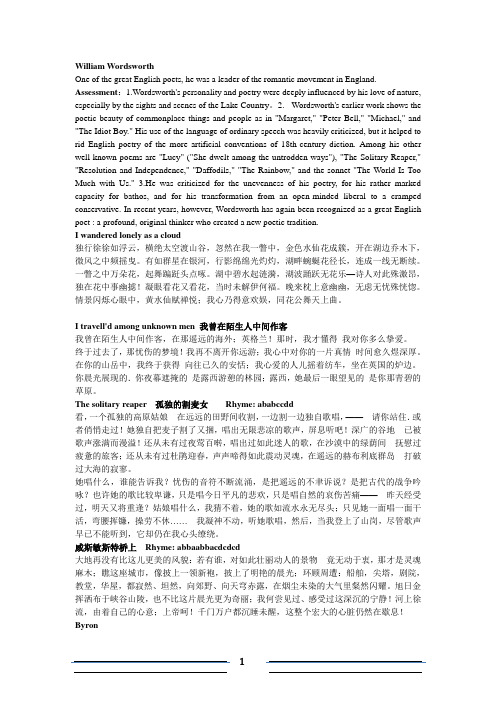
William WordsworthOne of the great English poets, he was a leader of the romantic movement in England. Assessment:1.Wordsworth's personality and poetry were deeply influenced by his love of nature, especially by the sights and scenes of the Lake Country。
2.Wordsworth's earlier work shows the poetic beauty of commonplace things and people as in "Margaret," "Peter Bell," "Michael," and "The Idiot Boy." His use of the language of ordinary speech was heavily criticized, but it helped to rid English poetry of the more artificial conventions of 18th-century diction. Among his other well-known poems are "Lucy" ("She dwelt among the untrodden ways"), "The Solitary Reaper," "Resolution and Independence," "Daffodils," "The Rainbow," and the sonnet "The World Is Too Much with Us." 3.He was criticized for the unevenness of his poetry, for his rather marked capacity for bathos, and for his transformation from an open-minded liberal to a cramped conservative. In recent years, however, Wordsworth has again been recognized as a great English poet : a profound, original thinker who created a new poetic tradition.I wandered lonely as a cloud独行徐徐如浮云,横绝太空渡山谷,忽然在我一瞥中,金色水仙花成簇,开在湖边乔木下,微风之中频摇曳。
- 1、下载文档前请自行甄别文档内容的完整性,平台不提供额外的编辑、内容补充、找答案等附加服务。
- 2、"仅部分预览"的文档,不可在线预览部分如存在完整性等问题,可反馈申请退款(可完整预览的文档不适用该条件!)。
- 3、如文档侵犯您的权益,请联系客服反馈,我们会尽快为您处理(人工客服工作时间:9:00-18:30)。
Amy Lowell (No great achievements )1.Leading advocate for Image2.Majory works: John Keats约翰济慈传(研究济慈的经典著作之一) A Dome of Many Glass 彩色玻璃大厦Sword Blades and Poppy Seed剑刃与罂粟花籽Men, Women and Ghosts 男人、女人和幽灵Pictures of the Floating World浮世图Legends传奇Robert Frost1.4 times (Pulitzer Prize for Poetry)2. American national poet3. American unofficial laureate Poet4.新英格兰诗人5.首先在英国赢得诗誉6.旧瓶装新酒Famous Poems:North of Boston波士顿以北The Road Not Taken未选择的路Mending Wall修墙Fire and Ice火与冰Stopping by Woods on a Snowy Evening雪夜林畔小驻(most famous)The Gift Outright全心全意的奉献(出席肯尼迪就职典礼时)Sherwood Anderson1.Major works: Winesburg, Ohio小镇畸人(the most famous)(half individual tales, half long novel form)(characterized by a casual development, complexity of motivation, and an interest in psychological process.)(an important work of experimental fiction set in a small-town environment.)Windy McPherson’s Son饶舌的迈克逊的儿子(it is the first work but not successful)(containing the psychological themes of inner lives of Midwestern villages, the pursuit of success and disillusionment.)(characterized by a casual development, complexity of motivation, and an interest in psychological process)The Triumph of egg and Other Stories鸡蛋的胜利及其他Death in the Woods and Other Stories林中之死及其他A Story-Teller’s Story讲故事人的故事(autobiographical)Marching Men2.In 1921 Anderson received the first Dial Award for his contribution to American literature.3.many subsequent writers, such as Hemingway and Faulkner, were influenced by his style.4.威廉·福克纳指出,Anderson是他们那一代美国作家之父,体现着美国创作的传统。
Wallace Stevence (Amateur)1.Major works: Anecdote of the Jar坛子的故事The Idea of Orders关于秩序的思想The Man with the Blue Guitar携带蓝色吉他的人Parts of a World一个世界的某部分Transport to Summer转入夏季The Auroras of Autumn秋天的晨曦Collectef Poems诗集Opus Posthumous遗作集The Necessary Angel必不可少的安琪儿(文集)William Carlos Williams (Amateur) (Against T.S. Eliot)1.Maijor works: Spring and All春天及一切(make him famous)The Red Wheelbarrow红色手推车(the most famous)Paterson佩特森(long poem)In the American Grain 美国性格(散文)Autobiography 自传Select Essays散文选2.有“红色手推车诗人”之称Ezra Pound1. Principles of Image意象派诗歌三原则1)D irect treatment of the “thing”, whether subjective or objective;2)T o use absolutely no word that does not contribute to the presentation;3)A s regarding rhythm, to compose in the sequence of the musical phrase, not inthe sequence of a metronome.2. His motto: “Make it new”3. Leader of Modernist and Imagist poets4. “In a Station of the Metro”: classic Imagist poem5. Wrote in Free Verse: no set rhyme or rhythm pattern.6. Major works: In the Station of the Metro在地铁站里The Cantos诗章Personae人物Exultations狂喜Homage to Sextus Propertius向赛克斯特斯·普罗波蒂斯致敬Cathay 华夏(所译的中国古诗集)The Spirit of Romance罗曼司精神(散文)Make It New要革新(散文)ABC of Reading阅读入门(散文)Guide to Kulchur文化指南(散文)Sinclair Lewis1. The first American writer who won the Nobel Prize.2.Major works: Babbit巴比特(most famous)Main Street大街Arrowsmith阿罗史密斯It Can’t Happen Here这不可能在这里发生Eugene O’Neill1.1936 Nobel Prize in Literature. (唯一获得诺贝尔的剧作家)2. He won Pulitzer Price for 4 times.3. He is the founder of serious drama.4. O’Neill is America’s greatest playwright, the first universally recognized world dramaticAmerican produced. He virtually established the modern American theatre.5.Maijor woks: Beyond the Horizon天边外(标志美国严肃戏剧的开端)(首次获得普利策奖)Anna Christie安娜·克里斯蒂(再次获得普利策奖)Ah, Wilderness!啊,荒野!(唯一一部喜剧)The Emperor Jones琼斯皇The Hairy Ape 毛猿Desire Under the Elms榆树下的欲望The Iceman Cometh卖冰的人来了Long Day's Journey into Night进入黑夜的漫长旅程(autobiographical play)(被一些评论家称为美国最好的悲剧)(大量运用象征手法)T.S. Eliot1. 20年代以后最有影响的美国诗人2. “荒原作家”(描绘西方现代“社会荒原”的面貌的作家)的领袖3. He won the Nobel Prize in Literature in 1948.4.写诗剧惯用的形式:dramatic monologue(戏剧独白)5.在美国文学评论史上最成功的“文学独裁者”6.Major works: 诗歌:The Love Song of J. Alfred PrufrockGerontion小老头The Waste Land荒原(划时代意义)(奠定艾略特在美国诗坛的地位)(标志现代英美诗歌的一场革命)(经过庞德修改后问世)The Hollow Men空心人Four Quartets四重奏(标志艾略特在思想上转向保守)剧作:Sweeney Agonistes力士斯威尼Murder in the Cathedral大教堂凶杀案The Cocktail Party鸡尾酒会The Confidential Clerk机要秘书评论文集:The Sacred Wood神木Essays on Style and Order风格及秩序论文集Essays Ancient and Modern古今文集Elizabethan Essays伊丽莎白论文集e·e·cummings1. Word games文字游戏2. Major works:诗集:Tulips and Chimneys郁金香和烟囱XLI Poems诗四十一首Is 5是5No Thanks 不谢Complete Poems: 1913~1926全集:1913~1926剧本:Him他Santan Claus圣诞老人散文:The Enormous Room 巨大的房间(记录他在俄国的经历)Langston Hughes1. Black poet, novelist, playwright in modern America.2. Outstanding representative of Harlem Renaissance.3.Harlem Poet Laureate(哈莱姆桂冠诗人)4. His literary creation paved the way for black realistic literature in America.5. Major works: Not Without Laughter 不是没有笑声The Ways of White Folks 白人的行径The Weary Blues萎靡的布鲁斯(第一部诗集)(讽刺小品集三部曲:)Simple Speaks of His Mind 辛普尔倾吐衷情The Best of Simple 辛普尔的高明Simple’s Uncle Tom辛普尔的山姆叔叔The Big Sea大海(autobiography)I Wonder as I Wander我徘徊,我彷徨(autobiography)The Negro Speake of Rivers 黑人谈河(学生时代作品)John Dos Passos( Major Writer in 30s)1. Major works: U.S.A—The Forth-Second Parallel北纬四十二度1919The Big Money赚大钱John Steinback(Major writer in 30s)1. He won the Nobel Prize in 1962.2. Major work: Cup of Gold金杯(the first novel)The Winter of our Discontent我们的不满的冬天( the last long novel)Of Mice and Men鼠与人The Grapes of Wrath愤怒的葡萄(a milestone in American literature)East of Eden 伊甸园以东Richard Wright1. Black writer2. Major works: Uncle Tom’s Children 汤姆叔叔的孩子们Native Son 土生子(标志美国黑人文学的成熟)Black Boy 黑孩子(autobiography)Sual Bellow (Jewish literature)1. He won the Pulitzer Prize and the Nobel Prize in Literature in 1976.2. Major works: Dangling Man摇来晃去的人(his first novel)The Adeventuras of Augie March奥吉·玛琪历险记(it secures Bellow’s status in American literature)Mr. Samler’s Planet 赛穆勒先生的行星Humbold’s Gift洪堡的礼物Norman Mailer (Jewish literature)1. He won the Pulitzer Prize for 2 times.2. Major works: The Naked and the Dead 裸体与死者(his first novel)The Armies of the Night 夜里的军队( The Pulitzer Prize)The Executioner’s Song刽子手之歌(The Pulitzer Prize)Ancient Evenings 古代的黄昏(他计划中三部曲的第一部)An American Dream一场美国梦Advertisement for Myself我自己的广告Ralph Ellison1. Black writer2.Mastepiece: Invisible Man看不见的人(被众多评论家与编辑在美国著名评论杂志《每周书评》上推荐为二战以来“最出色的一部作品”)J.D. Salinger (Jewish literature)1.Major works: The Young Folks年轻人Slight Rebellion off Madison麦迪逊街边的小乱子(首次出现《麦田里的守望者》中主人公的名字)The Catcher in the Rye (masterpiece)Allen Ginsberg (poet)1. Major works: Howl and Other Poems 嚎叫及其他(奠定他在美国诗坛的重要地位)Kaddish and Other Poems 凯地什及其他Empty Mirror 空镜子Realty Sandwiches 现实的三明治The Fall of America 美国的衰亡Planet News 行星消息Mind Breathes 精神呼吸2. Representative of the Beat Generation.(other two representatives are Jack Kerouac杰克·凯鲁亚克and William Burroughs 威廉·巴勒斯)。
